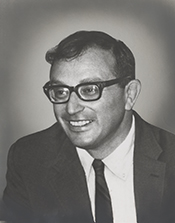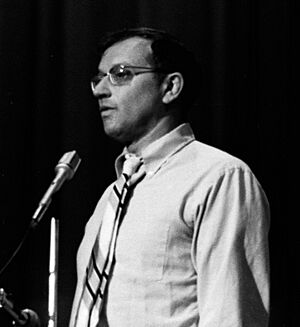Allard K. Lowenstein facts for kids
Quick facts for kids
Allard Lowenstein
|
|
|---|---|
 |
|
| Member of the U.S. House of Representatives from New York's 5th district |
|
| In office January 3, 1969 – January 3, 1971 |
|
| Preceded by | Herbert Tenzer |
| Succeeded by | Norman F. Lent |
| Personal details | |
| Born |
Allard Kenneth Lowenstein
January 16, 1929 Newark, New Jersey, U.S. |
| Died | March 14, 1980 (aged 51) New York City, New York, U.S. |
| Political party | Democratic |
| Spouse | Jennifer Lyman |
| Children | 3 |
| Education | University of North Carolina, Chapel Hill (BA) Yale University (LLB) |
Allard Kenneth Lowenstein (January 16, 1929 – March 14, 1980) was an American politician. He was a member of the Democratic Party. Lowenstein served as a U.S. representative for New York's 5th congressional district. He held this position for one term, from 1969 to 1971. He was also a well-known activist for civil rights and human rights.
Contents
Early Life and Education
Allard Lowenstein was born in Newark, New Jersey. His parents were immigrants from Lithuania. He had two older brothers. When he was very young, his mother passed away.
Lowenstein went to the Horace Mann School in New York City. He then studied at the University of North Carolina. While in college, he was the president of the National Student Association. He also led the Dialectic Society. Later, he earned a law degree from Yale Law School in 1954.
After law school, Lowenstein served in the U.S. Army from 1954 to 1956. He then became a college professor and administrator. He taught at universities like Stanford University and City College of New York.
Political Activism
Working for Change
Lowenstein was very active in politics and social causes. In 1949, he worked as a special assistant for Senator Frank Porter Graham. He also helped Senator Hubert Humphrey with foreign policy in 1959.
During the 1960s, Lowenstein spent time in Mississippi. He was part of the Freedom Summer project. This project helped African Americans register to vote. His work was featured in a documentary about the Civil Rights Movement.
Fighting Apartheid
In 1959, Lowenstein secretly visited South-West Africa (now Namibia). This area was controlled by South Africa. He gathered information about the unfair government there. After returning, he shared his findings with student groups. He also wrote a book called A Brutal Mandate. Eleanor Roosevelt, a famous human rights advocate, wrote the introduction for his book.
Lowenstein was a delegate at the 1960 Democratic National Convention. He also attended the 1964 Republican National Convention with his friend, Donald Rumsfeld. In 1966, he helped Senator Robert F. Kennedy write a speech about human rights. This speech was given in South Africa.
Challenging Presidents
In 1967, Lowenstein started a movement to challenge President Lyndon B. Johnson. He wanted a new candidate for the 1968 presidential election. He tried to convince Senators Robert F. Kennedy and George McGovern to run. When they declined, Lowenstein supported Eugene McCarthy. This movement helped lead to President Johnson deciding not to seek re-election.
After his time in Congress, Lowenstein led the Americans for Democratic Action. In 1971, he started a movement to challenge President Richard Nixon. Because of this, he was placed on Nixon's Enemies List. This was a list of people President Nixon did not like.
Serving in Congress
Lowenstein was elected to the U.S. Congress from Long Island, New York, in 1968. He served one term. In 1970, he lost his re-election bid. The boundaries of his district were changed by the state legislature. This made it harder for him to win. This practice is called Gerrymandering.
He ran for Congress several more times but was not elected again. In 1972, he ran in Brooklyn. He also ran in Long Island in 1974 and 1976. His 1974 campaign was his strongest showing. This was partly due to the Watergate scandal and President Nixon's resignation.
United Nations Work
In 1977, President Jimmy Carter appointed Lowenstein to a special role. He became the United States Representative to the United Nations Commission on Human Rights. He served as an ambassador, working on human rights issues. He resigned from this role in 1978 to run for Congress one last time.
Friends Across Parties
Allard Lowenstein was known for having friends from different political parties. He was a close friend of William F. Buckley, Jr., a well-known conservative writer. Buckley often invited Lowenstein on his TV show, Firing Line. He also supported Lowenstein's campaigns.
Lowenstein was also good friends with Republican Donald Rumsfeld. They became friends while working as aides in Congress. Even though they were from different parties, Rumsfeld supported Lowenstein's election in 1968. However, their friendship ended when Rumsfeld was pressured to support Lowenstein's opponent in 1970.
Family Life
Allard Lowenstein was married to Jennifer Lowenstein from 1966 to 1977. They had three children: Frank Graham, Thomas Kennedy, and Katharine Eleanor.
His children have also pursued important careers. Katharine Lowenstein is a lawyer who helps victims and works for juvenile justice. Thomas Lowenstein is a journalist who works with the New Orleans Innocence Project. Frank Lowenstein has served as a U.S. Special Envoy for Israeli-Palestinian Negotiations.
Death
Lowenstein was known for inspiring young people to get involved in politics. He was tragically killed on March 14, 1980. He was shot in his Manhattan office by Dennis Sweeney. Sweeney was mentally ill and believed Lowenstein was plotting against him.
Lowenstein's funeral was held in New York City. William F. Buckley, Jr. and Senator Ted Kennedy spoke at the service. Lowenstein is buried at Arlington National Cemetery. Sweeney was found not guilty by reason of insanity. He received psychiatric treatment for schizophrenia.
Honors and Memorials
Many things have been named in honor of Allard Lowenstein.
- Hofstra University created the Allard K. Lowenstein Civil Rights Scholarship in 2007.
- Yale Law School has the Allard K. Lowenstein International Human Rights Project. This project helps law students continue his work in human rights.
- The Long Beach Public Library in New York is named after him.
- In 1980, he received the Jefferson Award for Greatest Public Service.
- Singer/songwriter Harry Chapin wrote a song called "Remember When the Music" after Lowenstein's death.
- An area near the United Nations headquarters in New York City is named Allard K. Lowenstein Square.
- A documentary film about his life, Citizen: The Political Life of Allard K. Lowenstein, was made in 1983.
In Popular Culture
Allard Lowenstein was played by actor Brent Spiner in the 1984 TV miniseries Robert Kennedy and His Times.
See Also
- List of assassinated American politicians


